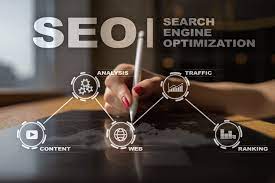The Power of Search Engine Marketing
Search Engine Marketing (SEM) has revolutionised the way businesses connect with their target audience online. In today’s digital age, where visibility is key, SEM offers a powerful tool to enhance brand awareness, drive traffic, and boost conversions.
What is SEM?
SEM involves promoting websites by increasing their visibility in search engine results pages through paid advertising. This form of online marketing allows businesses to bid on specific keywords relevant to their target audience, ensuring their ads appear prominently when users search for related terms.
The Benefits of SEM
One of the primary advantages of SEM is its ability to deliver targeted traffic. By strategically selecting keywords and demographics, businesses can reach potential customers at the precise moment they are searching for relevant products or services. This targeted approach not only increases the likelihood of conversions but also maximises return on investment.
Moreover, SEM offers instant results. Unlike organic search engine optimisation (SEO), which can take time to yield results, SEM campaigns can generate immediate traffic and leads. This makes it an ideal marketing strategy for businesses looking to quickly increase their online visibility and drive sales.
Key Components of Successful SEM Campaigns
To run a successful SEM campaign, businesses must focus on several key components:
- Keyword Research: Identifying relevant keywords that align with your business goals and target audience is essential for driving qualified traffic.
- Compelling Ad Copy: Crafting engaging ad copy that entices users to click and explore your offerings is crucial for driving conversions.
- Landing Page Optimisation: Ensuring that your landing pages are user-friendly, informative, and aligned with your ad messaging can significantly impact conversion rates.
- Analytical Insights: Regularly monitoring and analysing campaign performance metrics allows businesses to refine their strategies and maximise ROI.
In Conclusion
In conclusion, Search Engine Marketing presents a valuable opportunity for businesses to enhance their online presence and reach a highly targeted audience. By leveraging the power of SEM effectively through strategic keyword targeting, compelling ad copy, and continuous optimisation, businesses can achieve tangible results in terms of brand visibility, website traffic, and conversions.
Essential FAQs on Search Engine Marketing: Understanding SEM, Its Benefits, and Best Practices
- What is Search Engine Marketing (SEM)?
- How does SEM differ from Search Engine Optimisation (SEO)?
- What are the benefits of using SEM for businesses?
- How can businesses determine the right keywords for their SEM campaigns?
- What factors influence the success of an SEM campaign?
- Is it necessary to have a large budget to run effective SEM campaigns?
- What metrics should businesses track to measure the performance of their SEM campaigns?
- Are there any best practices that businesses should follow when implementing SEM strategies?
What is Search Engine Marketing (SEM)?
Search Engine Marketing (SEM) is a digital marketing strategy that involves promoting websites by increasing their visibility in search engine results pages through paid advertising. SEM allows businesses to bid on specific keywords relevant to their target audience, ensuring that their ads appear prominently when users search for related terms. This form of online marketing is highly effective in driving targeted traffic to websites, increasing brand awareness, and ultimately boosting conversions. By utilising SEM techniques such as keyword research, ad copy optimisation, and campaign analysis, businesses can enhance their online presence and reach a highly qualified audience actively searching for their products or services.
How does SEM differ from Search Engine Optimisation (SEO)?
In the realm of digital marketing, a common query revolves around the distinction between Search Engine Marketing (SEM) and Search Engine Optimisation (SEO). While both SEM and SEO aim to enhance a website’s visibility in search engine results, they employ different strategies to achieve this goal. SEM primarily involves paid advertising to promote a website, where businesses bid on keywords to display their ads prominently in search results. On the other hand, SEO focuses on organic methods to improve a website’s ranking, such as optimising content, meta tags, and backlinks. In essence, SEM offers immediate visibility through paid campaigns, while SEO focuses on long-term strategies to boost organic traffic and improve search engine rankings. Each approach plays a unique role in a comprehensive digital marketing strategy, catering to different objectives and timelines.
What are the benefits of using SEM for businesses?
When it comes to utilising Search Engine Marketing (SEM), businesses can reap a multitude of benefits. By leveraging SEM strategies, businesses can significantly enhance their online visibility, driving targeted traffic to their websites. This increased visibility not only boosts brand awareness but also increases the likelihood of conversions, ultimately leading to improved sales and revenue generation. SEM offers businesses the advantage of instant results, allowing them to quickly connect with potential customers actively searching for their products or services. Additionally, SEM provides valuable insights through analytics, enabling businesses to refine their marketing strategies and maximise return on investment. Overall, the benefits of using SEM for businesses are vast, offering a powerful tool to reach and engage with their target audience effectively in the competitive digital landscape.
How can businesses determine the right keywords for their SEM campaigns?
Determining the right keywords for Search Engine Marketing (SEM) campaigns is a critical aspect of achieving success in online advertising. Businesses can start by conducting thorough keyword research to identify terms that are relevant to their products or services and have high search volume. Utilising tools such as Google Keyword Planner, SEMrush, or Ahrefs can provide valuable insights into popular keywords, search trends, and competition levels. Additionally, businesses should consider the intent behind specific keywords to ensure they align with their target audience’s needs and preferences. By continuously monitoring and refining their keyword selection based on performance data and industry trends, businesses can optimise their SEM campaigns for maximum visibility and effectiveness.
What factors influence the success of an SEM campaign?
When considering the factors that influence the success of a Search Engine Marketing (SEM) campaign, several key elements come into play. Firstly, thorough keyword research is crucial in identifying the most relevant and high-performing keywords that align with the target audience’s search intent. Additionally, the quality and relevance of ad copy play a significant role in enticing users to click on the ads and engage with the content. Landing page experience and optimisation are also vital factors that can impact conversion rates and overall campaign performance. Regular monitoring, analysis of campaign data, and continuous refinement based on insights are essential to ensure sustained success in SEM campaigns.
Is it necessary to have a large budget to run effective SEM campaigns?
When it comes to running effective SEM campaigns, the size of the budget is not the sole determining factor of success. While having a larger budget can certainly provide more opportunities for reaching a wider audience and bidding on competitive keywords, it is possible to run impactful SEM campaigns even with a modest budget. Strategic planning, targeted keyword selection, compelling ad copy, and continuous optimisation are key elements that can maximise the effectiveness of SEM campaigns regardless of budget size. By focusing on relevance, quality score, and conversion rate optimisation, businesses can achieve significant results and a strong return on investment without necessarily requiring a large budget.
What metrics should businesses track to measure the performance of their SEM campaigns?
When evaluating the performance of their Search Engine Marketing (SEM) campaigns, businesses should track a range of key metrics to gauge effectiveness and return on investment. Some crucial metrics include click-through rate (CTR), which indicates the percentage of users who clicked on the ad after seeing it; conversion rate, which measures the percentage of users who completed a desired action, such as making a purchase or filling out a form; cost per click (CPC), representing the amount paid for each click on the ad; and return on ad spend (ROAS), which calculates revenue generated relative to advertising costs. By monitoring these metrics closely, businesses can assess the impact of their SEM efforts and make informed decisions to optimise performance and achieve their marketing objectives.
Are there any best practices that businesses should follow when implementing SEM strategies?
When it comes to implementing SEM strategies, businesses can benefit greatly from adhering to best practices that can maximise the effectiveness of their campaigns. Some key recommendations include conducting thorough keyword research to target relevant search terms, creating compelling ad copy that resonates with the target audience, optimising landing pages for a seamless user experience, and regularly monitoring and analysing campaign performance metrics to make data-driven adjustments. By following these best practices, businesses can enhance the success of their SEM efforts and achieve better results in terms of visibility, traffic, and conversions.




